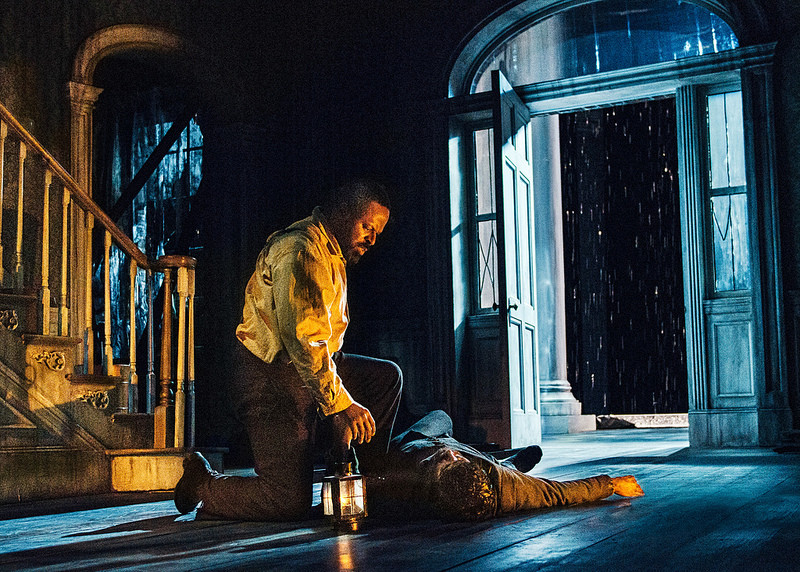Review: PCS's "The Whipping Man"

Gavin Gregory and Carter Hudson on Tony Cisek's remarkable set, complete with real rain. Photo by Patrick Weishampel.
When Passover, the Jewish holiday commemorating the Israelites' Biblical-times liberation from Egyptian slavery, takes place later this month, Jewish people will not only celebrate freedom, but will reflect on what freedom means—and what responsibilities it comes with. Portland Center Stage's timely and thoughtful new production, The Whipping Man, is set in the days leading up to Passover, 1865, just after the end of the Civil War. It poses the same fundamental question the holiday does—you're free: what's next?—but in a way that finds poetic and profound cross-currents between two moments of emancipation that unfolded centuries apart.
The Whipping Man Portland Center Stage
Gerding Theatre
Thru March 23In the play, written by New York's Matthew Lopez and directed here by PCS Associate Artistic Director Rose Riordan, Caleb (Carter Hudson), the only son of the wealthy Jewish DeLeon family, returns home from the Civil War's battle finale gravely wounded, only to find that the family's Richmond mansion has been all but destroyed by the war and the entire family has fled the city—save two of their now-ex-slaves, whom the DeLeons raised in the Jewish tradition. Simon (Gavin Gregory), a man in his 50s, had been owned by Caleb's family for two generations. Uneducated though he may be, he possesses a great deal of savoir-faire and wisdom. By contrast, John (Christopher Livingston), who's about Caleb's age, is book-smart but immature. He's also more willing than Simon to test what the postbellum social structure will bear, looting abandoned neighboring homes and exploiting the uncertain new power dynamic between him and Caleb with a confused mix of glee and anger born from years of oppression and abuse (the two were peas in a pod, recalls Simon, until Caleb's father and the whipping man came between them).
After being forced to amputate Caleb's gangrenous leg, John and Simon stay and nurse their former master back to health out of ambiguous personal motivations: shreds of loyalty and affection, a sense of religious/ethical duty, and a former promise by Caleb's father to come back and give them money to begin their new lives as free men. Outside the DeLeon residence, the country reckons with its schism; inside, Caleb, Simon, and John struggle to come to terms with their new freedom to define their relationships and distinguish between right and wrong.
After premiering off-Broadway in 2011, The Whipping Man rapidly made its playwright, Matthew Lopez, a hot ticket. (The play is currently one of the most produced in the country, with 15 stagings slated for this season.) Lopez deserves the success; the parallels he draws between the Jewish and African-American experiences are positively inspired. For instance, during the play's climactic scene, a Passover seder that gorgeously syncretizes the traditional ceremony and African-style call and response, Simon breaks several times into “Go Down, Moses”—a Negro spiritual inspired by the Israelite exodus from slavery and sung today by many Jews as part of the seder.
Lopez's script receives an excellent turn from PCS, with the production's three-man cast delivering strong performances in demandingly complex roles. Christopher Livingston, as the audacious John, occasionally betrays an anachronistically modern comic sensibility, but he is, on balance, nuanced and fluid. Gavin Gregory's portrayal of the abiding Simon, meanwhile, is exceptionally moving, particularly when late plot turns rock the character's even keel. Finally, the play's set, designed by Tony Cisek, is transporting and strangely beautiful as the DeLeons' physically and metaphorically collapsing manse.
During The Whipping Man's seder scene, Simon presses John and Caleb to think about freedom broadly: as freedom from alcohol dependence or, say, reliance on outdated ideas. When the play ends soon afterward, it feels abrupt, yet fitting. As The Whipping Man leaves certain characters amid their ruins, so it leaves the audience in its seats: deciding for themselves how to live.




